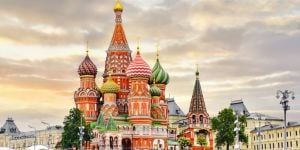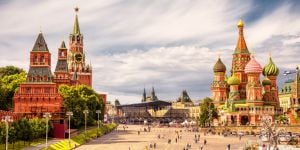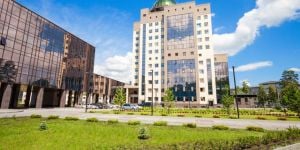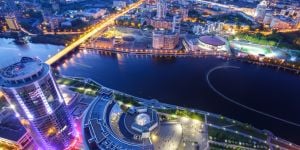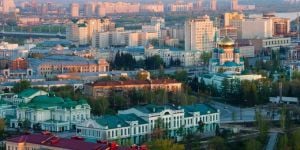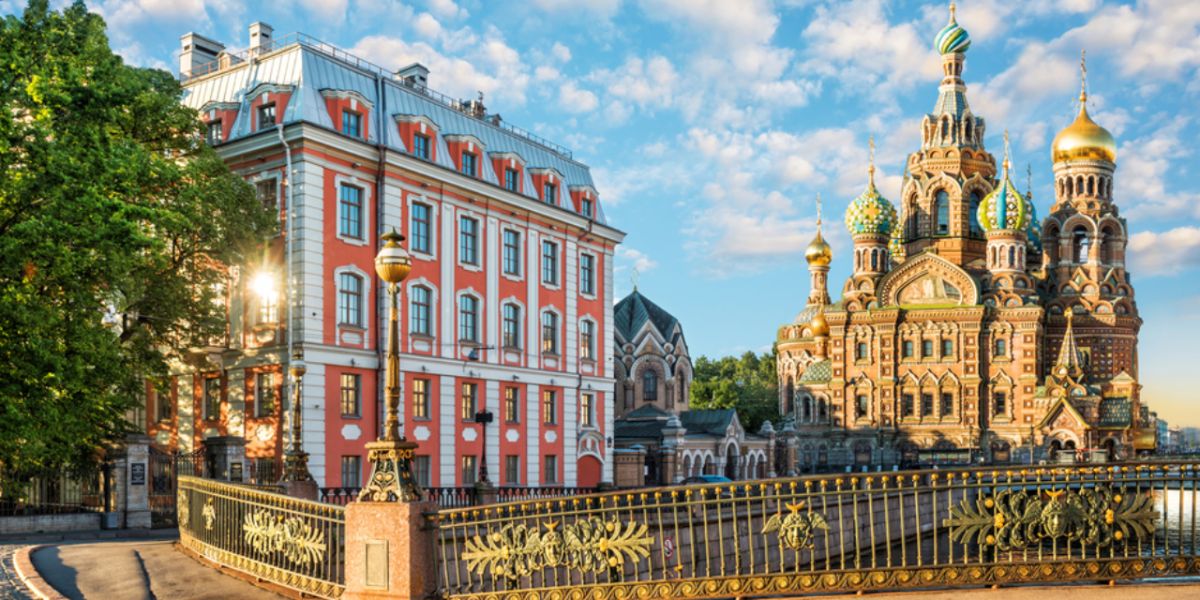
Renamed successively Petrograd, Leningrad, and finally, Saint Petersburg, the city of Peter the Great was Russia's capital city for over 200 years and remains its cultural heart. Often nicknamed the “Northern Venice”, Saint Petersburg's unique cultural and architectural heritage make it one of the top destinations in the world.
The city was built on over 200 km of canals and rivers, and has more bridges than in Venice. It has gone through almost as many floods as its 303 years of existence, something you may want to take into account when choosing your accommodation. But it is the city's 300 museums, 70 theatres, 100 music and art festivals, as well as the natural phenomenon called 'the white nights' that keep attracting millions of visitors every year. Students will find it very hard to get bored in one of the world's leading cultural city destinations.
Saint Petersburg State University
Saint Petersburg State University is Russia's oldest academic institute, created by Tsar Peter the Great in 1724 as the first academic university in the Russian empire. Prominent world leaders, artists, and scientists have studied at Saint Petersburg State University, amongst them Lenin, Vladimir Putin, Dmitri Medvedev, Ivan Turgenev, Igor Stravinsky and Dmitry Mendeleev. The prestigious institute also counts 9 Nobel prizes laureates: Nikolay Semenov, Lev Landau, and Leonid Kantorovich, to name but a few.
The institute takes pride in its numerous partnerships with universities from 70 countries. It also takes part in international student exchange programmes such as Erasmus Mundus and Erasmus . The university campus totals 21,596 students, of which 2,600 are foreigners. As of September 2017, students could enroll on 76 bachelor, 172 master, and 263 doctoral programmes (taught in Russian) in physical and mathematical sciences, computer and information sciences, natural sciences, economics and management, social sciences, humanities, art, and culture. They could also enroll on 3 bachelor programmes (taught in English) in Russian studies, English language and literature, and international management, in addition to 16 master programmes taught in English, French, German, Italian, and Spanish.
A bachelor's degree costs between â¬3,130 and â¬7,382, a master's degree between â¬2,840 and â¬6,733 and a Ph.D. degree between â¬2,980 and â¬7,382 per academic year. International students may enter a competition to be awarded the state scholarship which covers tuition fees and provides students with about â¬22 per month to pay for their dormitory and part of their daily expenses. To help prospective students, the university has made a list of all required documentation to apply for the state scholarship.
In order to apply at Saint Petersburg State University you will need to create an account on the university's website, fill in the application form, upload your latest diploma and corresponding transcripts, an ID document valid for 18 months after the start of your programme, 4 passport-style photographs, and a certificate of Russian language proficiency if you do not possess a diploma from a Russian institute. Note that you must provide a notarised translation of all your documents issued in a foreign language and an apostille for all your foreign diplomas. Applicants to Ph.D. programmes should also provide a CV, an overview of prospective research, copies of research papers, in addition to abstracts from a graduation project. Finally, applicants have to sit through admission tests, which are held in Russian except for programmes taught in English. Admission tests are held during the second half of June and July and the first half of August. Application deadlines vary. If you apply for the state scholarship at the same time, the deadline is set around mid-June. Otherwise, it is set during the first week of August if you do not need visa support, or the first week of July if you need a letter of invitation. Note that the letter of invitation usually takes 40 days to be issued and is sent by the university.
The university possesses 22 halls of residence in 3 districts with a capacity of 12,329 places and rooms for one to three people. Prices start from â¬84 per month for a three people bedroom with a kitchen shared between all the residents of the same floor to â¬124 per month for a single person bedroom in a two or three bedroom flat. Unlike some of Moscow halls of residence, dormitories at Saint Petersburg State University are conveniently located near public transportation. The university's website contains more detailed information on the campus facilities and students societies.
Peter the Great Saint Petersburg Polytechnic University
Peter the Great Saint Petersburg Polytechnic University was founded in 1899 by three prominent figures: Vladimir Kovalevsky, Serguei Witte, and Dmitri Mendeleev, author of the Periodic Table of Elements. Amongst its most notable students were Nobel Prize laureates Nikolai Semenov, Peter Kapitza, and Zhores Alferov.
In 2017, out of the 31,172 students studying at Peter the Great Saint Petersburg Polytechnic University, 5,000 were foreigners. Over 45% of the students study engineering, technology, and technical sciences and another 40% study social sciences. The areas of research conducted at the institute include nuclear physics, bioinformatics, space exploration, robotics, and nanotechnologies etc. The institute offers programs in over 50 fields of study. Bachelor's diplomas cost from â¬2,436 for applicants from the CIS and Baltic countries and from â¬2,657 for applicants from the rest of the world, whilst master's degrees cost from â¬2,569 for CIS and Baltic countries natives and from â¬2,805 for students from the rest of the world. Students may also choose from 25 bachelor's and master's degrees taught both in Russian and English at Saint Petersburg Polytechnical Institute and a partner university abroad. Existing bilateral agreements between partner universities and SPbPI guarantee free tuition fees to exchange students; however, living costs and dormitories are still at the student's charge. Candidates may apply for the exchange program before May 15th to come for the autumn semester and before October 15th for the spring semester. For all full-time programs, applications are open from February 1st. Required documentation includes your passport, your previous diplomas, and transcripts, together with their translation in Russian or English and their apostille.
Foreign students may apply for the Russian state scholarship or scholarships available in their home country. International students can also apply for a dormitory room at one of the three dormitories located near the institute. There are 7,000 dormitory places in bedrooms for 2 to 4 people. Facilities in the dormitories include a fitness room, classrooms for students to meet and work in groups, a launderette, free Wi-Fi zones, TV access etc. A room in the university's dormitories costs between â¬46 and â¬78 per month depending on the comfort conditions. International students are placed in the most recently acquired dormitories. Guests and parents are welcome on the university campus and special hostel rooms are available to them.
Saint Petersburg State University of Information Technologies, Mechanics and Optics
Founded in 1900, Saint Petersburg State University of Information Technologies, Mechanics and Optics (ITMO) is specialized in internet technologies and programming, computer technologies and controls, photonics, the refrigeration industry and food biotechnologies, in addition to economic management and innovations. The university counts politicians, CEOs of research institutes and companies all over the world amongst its alumni, such as former president of Kyrgyzstan, Askar Akayev, head of the Russian Institute of radio navigation and time, Seguei Pisarev, and Palomar medical technologies Inc. CEO, Grigory Altshuller. The ITMO university is ranked 81 in the Emerging Europe and Asia QS top universities list and 56 on the Times Higher Education list of best universities for computer science degrees. As of 2017, the institute counted 11,200 students and 1,500 international students from 71 countries. The institute collaborates with over 100 universities worldwide on various educational and research programs from silicon and fiber photonics and photonics microsystems, to biotechnologies of the third millenary.
Applicants for bachelor's diplomas may choose from 11 majors in the school of economics, management and innovations, 12 in the school of biotechnology and cryogenic systems, 20 in the school of photonics, 10 in the school of translational information technologies and 17 in the school of computer technologies and control. The institute also offers 193 master's diplomas and 46 PhD degrees, as well as a dozen double master's degrees with partner universities in Estonia, Finland, France, Poland and The Netherlands. These curriculums are divided into two years, the first one which takes place at ITMO university and costs between â¬3,000 and â¬3,233, whilst tuition fees for the second year are set by and paid to the partner university. Bachelor's degrees cost from 165,000 roubles (â¬2,365)per academic year whilst master's cost from â¬2,709. Application usually starts in February and ends in July. The university guides its applicants through the application process for each type of degree.
Amongst the scholarship options available at ITMO applicants may apply to the fellowship for international researchers in their postdoctoral and early career to finance research project. The fellowship covers travel and visa expense and provides a â¬2,199 monthly allowance as well as a â¬8,797 additional allowance per year which can be used to purchase necessary equipment, and cover travel expenses to international conferences and publishing fees in high-ranked journals. German applicants may apply to the German academic exchange service, whilst American nationals can try their luck with the Fulbright scholarship.
The state and price of the university dormitories varies. Students who wish to reduce their expense can choose the cheapest dormitory option for â¬5-10 per month and share a 3 people bedroom in an old building with one kitchen and one bathroom per floor. Those who prefer comfort may choose a 2 people bedroom in a newish building with one kitchen and one bathroom per floor for â¬37 per month. Access to broadband WI-FI is included in the price.
Work and Internship in Saint Petersburg
While living in the university's dormitories might be relatively cheap, for those who prefer the comfort and independence of an individual flat, it might be necessary to find a job to pay their rent and bills. Foreign students are not allowed to work whilst staying in Russia on a student visa. However, if you find a company ready to provide you with visa support you can work on their visa whilst studying. This is the safest way to combine studies, usually evening courses, with work during daytime. Note that some international students go around the regulations by giving private lessons at the clients' home or working remotely and being paid to foreign bank accounts or in cash.
It is also illegal for international students to do a paid internship. Nevertheless, some companies do not mind paying their interns in cash instead of a bank deposit. Whether you can receive a salary or not is to be negotiated on an individual basis with the company. In some cases, the university accepts internships completed up to one year before the start of the course. In this case, students have to show an internship report and a letter signed and stamped from the company in which they completed their internship. It is best to check with your academic advisor beforehand whether your university takes into account previous internships. For unpaid internship options, your university in Russia may help you in your search. Sometimes they have a list of partners that take on a few students from the university each year. You will still have to go through the selection process, apply for the internship, write a cover letter etc. Your academic advisor will also provide you with the contract that you will have to sign with the company.
Private accommodation
For those who wish to have their own bedroom but are not too bothered about sharing the rest of the facilities with other people, a room in a decent state in the city centre may cost from â¬221 per month and a one bedroom flat from â¬442 per month.
Cian and Avito are useful websites (though in Russian) to help you find the right accommodation.
Student monthly budget
Your accommodation budget will depend on what kind of accommodation you choose. If you chose to live in the dorms, food will be your main expense. Expect to spend around â¬220 per month at the supermarket, â¬1.75 for lunch at the university's canteen and about â¬9 to eat out in a mid-ranked restaurant. A taxi ride in the city center costs â¬2.50 on average depending on the time and distance you travel. The city counts a great number of taxi companies offering competitive prices and several payment methods. As of September 2017, Uber seems to be offering the most attractive prices and the best client service. Beware of Yandex taxis as they do not always handle client complaints and may not offer refunds or discounts when their app or website crash and you've already paid for unfulfilled trips. Avoid unofficial taxis when traveling alone.
Visa
To study in Russia you will need a visa. If you are already living in Russia on a work visa when applying to university, you may keep your visa so as to be able to keep working if you wish. If you do not have a visa you will need to apply for a student visa. Once your application has been accepted, the university will send you an invitation letter to apply for a visa in your home country. Documents required for a student visa may vary from one country to another but in most cases, you will need to provide the Russian consulate or embassy with the following:
- Your passport;
- A copy of the first two pages of your passport;
- An ID photo;
- A completed application form;
- An insurance policy valid for the first three months of your stay;
- The letter of invitation from the university;
- The proof of payment of the visa fees.
Student lifestyle and leisure
The Northern Venice has everything to keep you busy and interested during your studies. There are numerous museums, galleries, and theatres as well as bars and restaurants for everyone's taste. The city hosts one of the biggest and most beautiful museums in the world, the Hermitage, as well as the Russian Museum, which has the largest collection of Russian art in the world. The entrance is free for foreign and Russian students. You may also fancy watching an opera or a ballet at one of Russia's most famous theatres: the Mariinsky theatre. You can wander in the gardens of Catherine the Great's Winter Palace or Tsarskoye Selo, located just 24 km away from Saint Petersburg center, or even Peterhof, her summer palace 25 km away from the center, accessible via a ferry just outside the Hermitage.
For those who want to keep fit but cannot invest in a gym membership, several sport centres give free classes.
Getting around
The city of Saint Petersburg is spread over several islands which you can reach by foot crossing the bridges since the city is not very large. Saint Petersburg also has buses, trolleybuses, tramways, and a metro. Students benefit from a special tariff for the city's public transport card, renewable every month for â¬15. This card gives them unlimited access to metro, buses, trolleybuses, and tramways in Saint Petersburg for one month.
We do our best to provide accurate and up to date information. However, if you have noticed any inaccuracies in this article, please let us know in the comments section below.
